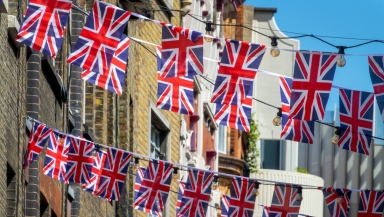
Failure
Those of us who can remember past conflicts involving Israel such as the Six-Day War (1967) and the Yom Kippur War (1973) can recall news clips from far away followed by conversations with family and friends admiring Israel's determination not to be destroyed. What we don't recall are mass demonstrations throughout the West with calls for jihad against Israel and support and justification for the evil acts of Hamas. What changed? The conflict is the same: it is the West which has changed.
'Diversity is our greatest strength' – we have heard this ad nauseam. But no one ever points out any verifiable benefits for all the West. Surely there must be something more than being able to eat khuushuur or boortsog in a Mongolian restaurant in Islington? Seen as a way of welcoming immigrants to the West without exacerbating tensions between indigenous people and newcomers, it is evident that multiculturalism has failed and is instead the cause of increasing tensions.
As long ago as 2010 even Angela Merkel, then Chancellor of Germany and one of the foremost facilitators of mass immigration, admitted that Germany's experiment with multikulti had failed. She observed that it created communities of different cultural background living side by side with little if any meaningful contact.
Opposition is Bigotry
One of the most effective tools of the elites to manoeuvre us into accepting multiculturalism is to equate opposition to multiculturalism with racism. It is not racist to be concerned about multiculturalism. You can be comfortable with racial diversity and simultaneously anxious about religio-cultural diversity. This is by no means a contradictory position: religions are not races.
Neither is concern about multiculturalism a form of 'phobia'. It is sensible to be concerned about the impact of bringing into your country a great number of people from unstable countries, many of whom have contempt for our way of life and values and no desire to integrate. The creation of communities preserving cultural and legal norms vastly different from those of the indigenous people inevitably breeds tension.
Danger
The gravest danger to Britain's multi-ethnic democracy is not white-British racism, it is the importation of tribal ideologies fuelling tensions between its minorities. Whether it is American-inspired racial identity politics such as BLM, religious and community hatred carried over from the sub-continent, or Arab-world sectarianism, community cohesion in relatively diverse parts of the country is under strain. The most divisive fault lines in today's Britain do not involve the white British mainstream at all.
Inter-racial conflicts between BAME communities are nothing new. The 2005 Birmingham riots which led to two fatalities, were primarily between people of Pakistani origin and Black Caribbean heritage. Last year parts of Leicester experienced large-scale public disorder mainly between Hindu and Muslim youths. In September the London district of Peckham saw racial tensions spike following a physical altercation between the Pakistani heritage owner of Peckham Hair and Cosmetics and a black woman he accused of theft. Amongst the many racist messages left on the front of the business included 'Racist Asians, go to hell Patel' and 'Black owned only', the latter calling for a boycott of non-black businesses.
There is a danger of growing ill will among native Britons at unequal treatment. In 2020 more than 150 people were arrested at an anti-lockdown protest in London; in 2023 protesters called for jihad against Israel and clambered on the Cenotaph waving Palestinian flags, and the police stood by. Christians can be arrested for silently praying in the vicinity of an abortion clinic, yet hundreds of Muslims can kneel and pray at the gates of 10 Downing Street without hindrance. These disparities of treatment can only stoke up already existing community resentment.
Not all Equal
Multiculturalism means that there is no expectation of integration. We have been hospitable to a fault, changing our laws, providing documentation in myriad languages along with free translation services, giving significant amounts of money via charities that discriminate against the indigenous population. We have introduced quotas where skin colour is more important than ability. Despite all this accommodation, we are still abused as racists and xenophobes.
Not all cultures are equal. Not all beliefs, values or religions are equal and should be accommodated. Societies that treat women as fully human are better than those that subjugate them to men, dictating their clothing and educational opportunities and restricting their movements without male permission. Societies which support freedom of speech are better, more able to develop and live in internal peace, than those which kill those who utter unacceptable views.
Inevitable Failure
Ultimately multiculturalism is doomed to failure: its very purpose ensures this. In seeing diversity as a strength and championing difference over unity, it rejects the fundamental necessity of a central moral and cultural standard around which people can bond. Without that, no society can cohere. When King Charles speaks of the UK being 'a community of communities' he is encouraging division amongst his subjects because there will always be tensions between those who hold conflicting world-views.
Without a shared and trusted cultural framework, we can never hope to develop the trust and mutual respect which is necessary if society is to hold together. Without the shared sense of identity it creates, all we have is an increasingly loose collection of competing interests and parallel societies which tear apart at the slightest pressure. In substituting tribal loyalties over shared endeavour, we ensure the failure of the nation.
What Changed?
The fundamental change in the West since the 1960s is that we have abandoned that which held us together. We might have differed over our politics, religion or social background, but we lived together relatively harmoniously. With the rejection of the Christian-based system of morality and law which created our culture we abandoned the culture itself. The despisers of Christianity have loosened our ties and opened the door to distrust and conflict.
Campbell Campbell-Jack is a retired Church of Scotland minister. He blogs at A Grain of Sand.













